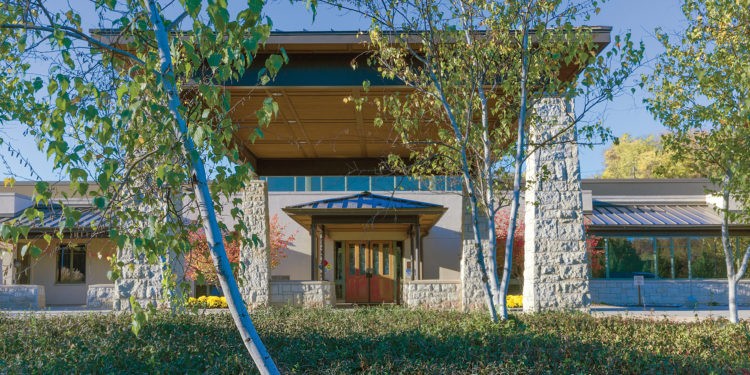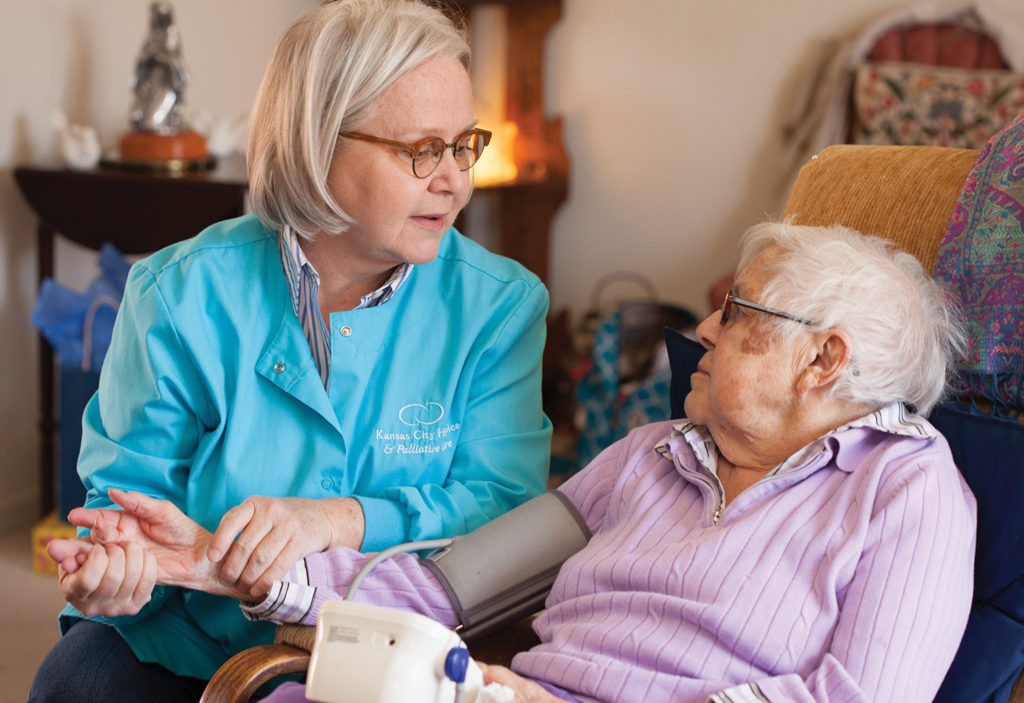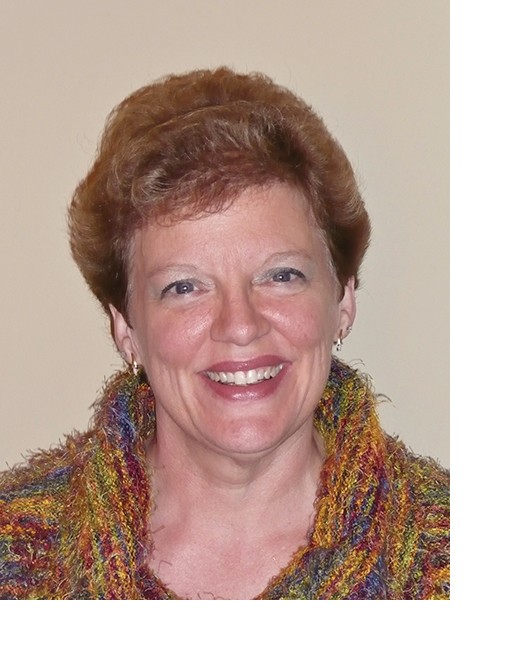Kansas City Hospice & Palliative Care: Here to Help

It’s not always possible to change the outcome for someone, but through hospice, there is a way to fill the journey with love and compassion.
Every life is precious, and everyone matters through the last moments of their lives. Kansas City Hospice & Palliative Care fully understands this, and while their amazing team of compassionate caregivers and volunteers may not have the ability to add days to your life, they can certainly add life to your days. For this team of caring professionals, it’s not just about helping a person die peacefully and with dignity; it is also about helping them live as fully as possible until it is time to truly go home.
Kansas City Hospice & Palliative Care compassionately holds the hands of those who are on that journey, offering heart-to-heart caring at a time when it is needed most. When you or someone you love is dealing with a life-limiting illness, you and your family want to do whatever is possible to ensure the patient receives the best care possible. Hospice provides palliative care for those end-of-life situations. Offering comprehensive expert care for all ages at all stages of serious illness to those residing in the metro area and surrounding counties, Kansas City Hospice & Palliative Care is ready to serve you and your loved ones.

What is the difference between hospice and palliative care?
Palliative care concentrates on improving the quality of life throughout the treatment of a serious illness by providing practical, emotional and spiritual support. As a form of palliative care, hospice care focuses on symptom management and relief when someone living with a serious illness approaches the end of life. Just being there for someone can help give hope when everything else seems hopeless.
 “We provide care not only for patients but also those for whom they designate as family,” emphasized Pam Harris M.D., FAAPMR, FAAHPM, Director of Medical Programs for the facility. “Our job is to improve the patient’s quality of life and care of the family unit with the best symptom management available. We focus on the patient’s comfort and symptom management where and how they choose.”
“We provide care not only for patients but also those for whom they designate as family,” emphasized Pam Harris M.D., FAAPMR, FAAHPM, Director of Medical Programs for the facility. “Our job is to improve the patient’s quality of life and care of the family unit with the best symptom management available. We focus on the patient’s comfort and symptom management where and how they choose.”
Dr. Harris leads an expert team of hospice and palliative care physicians and nurse practitioners, including doctors Mark Wiles, Timothy Link, David Dugan, Janis Steinbrecher, Susan Lanningham, David Ernst, Karin Porter-Williamson, Christi Bartlett, Ky Stotzfus and Ben Schoch.
The medical team provides patient care not only at in-patient facilities including their own Kansas City Hospice House™ and NorthCare Hospice House and skilled nursing facilities throughout the community, but will also come to the patients’ homes who otherwise might not have a primary caregiver. In order to be eligible for hospice care, a patient’s life expectancy must be six months or less if the disease takes its usual course.
“Hospice is really for the very end of life,” noted Dr. Harris. “And most patients choose to stay at home during this time. Patients who stay at one of our facilities typically have a condition that cannot be managed at home or in a nursing facility. However, the majority choose to reach the end of life at home. Palliative care, on the other hand, can be given at any time for someone who has been diagnosed with a serious, life limiting illness. We have a home health team that will go to the home for patients who may be pursuing some active medical treatment. We operate like a hybrid between a home health team and a hospice team.”

The team at Kansas City Hospice & Palliative Care may work with patients for a matter of months to a very short time, some times just days or hours. “Sometimes it’s a matter of doctors not recognizing how close to death someone is or perhaps the issue is not brought up to the family or there is an over-estimation of prognosis,” said Dr. Harris. “It’s ideal if a referral to hospice is made early, so quality of life can be maintained for as long as possible.”
While Medicare dictates the rules regarding the “six months or less” criteria, Dr. Harris indicated patients can remain on hospice for longer periods of time, as long as the patient meets certain criteria under mandatory review, which could lead to an indefinite amount of time under hospice care.

“Some patients get better, leave and then come back at a later point in time,” explained Dr. Harris. “For example, someone might be experiencing a slow decline with dementia but then will hit a plateau. Some patients are resolute and ready for the end of life. Our interdisciplinary team helps patients through the process on all levels – psychological, social, spiritual, and physical.”
Kansas City Hospice & Palliative Care also offers those designated as family a continuum of care in terms of bereavement for up to 13 months. This includes counseling, support groups and even specialized camps for kids. Hospice is for patients of all ages, even kids, infants, and those still in the womb.
“We can start working with families prior to birth if the condition is known to be life-limiting,” said Dr. Harris. “We work with families to create a pre-birth plan, as there are so many things to think about and do ahead of time. This allows us to avoid a crisis and make decisions as to how to spend that time. While we can no longer fix what’s wrong for the patient and family, we can help make the experience better.”

Other programs offered through Kansas City Hospice & Palliative Care include Solace House Center for Grief and Healing, helping children and families who have experienced the death of someone close to them. Most often, this is sudden death, such as through a car accident or suicide. Camp Erin and Camp Carousel are overnight grief camps that also help children and families cope with grief and loss. Passages, a counseling service, helps individuals who have experienced difficult life transitions. Carousel provides palliative and hospice care for perinatal and infants through young adults and is the only hospice team of pediatric nurses, social workers, chaplains and other specialists in the region which is dedicated to the unique needs of children and their families. Kansas City Hospice & Palliative Care also provides art therapy, music therapy and pet therapy, and is grateful for more than 500 volunteers who support patient care throughout the community.
“This is the best hard job you will ever have,” reflected Dr. Harris, who has been in her position for 12 ½ years. “It’s definitely a calling and something you feel led to do.”
For those who think it may be time for hospice, it is necessary they contact their physician, as hospice requires two doctors who agree on the six months or less criteria. This can include the patient’s personal physician and the hospice medical director.
“We are always happy to help educate folks about the importance of palliative care and hospice,” expressed Dr. Harris.
Kansas City Hospice Locations
Kansas City Hospice & Palliative Care
1500 Meadow Lake Parkway, Suite 200, Kansas City, MO 64114
Kansas City Hospice House
12000 Wornall Road, Kansas City, MO 64145
Kansas City Hospice – North Office
2000 NE Vivion Road, Suite 200, Kansas City, MO 64118
NorthCare Hospice House
2800 Clay Edwards Drive, 2nd Floor, North Kansas City, MO 64116
Kansas City Hospice – Kansas Office
10100 West 87th Street, Suite 100, Overland Park, KS 66212
Solace House Center for Grief & Healing
8012 State Line, Suite 202, Prairie Village, KS 66208






